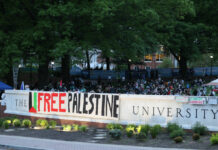Congregations of different religions and ethnic backgrounds gathered from across the Baltimore area on Aug. 10 to celebrate the impact of their shared commitment to faith and the environment.

The Celebrating Chesapeake Champions event, held by Interfaith Partners for the Chesapeake (IPC), brought together new and longtime members of this interfaith partnership.
IPC members strive to adopt more sustainable practices in multiple areans to preserve local wildlife in the Chesapeake area. IPC also engages in environmental volunteer work, planting trees and forming “Green Teams” to address local environmental issues.
Additionally, they have played a significant role in local environmental policy, advocating for the 2019 state styrofoam ban and helping pass the Climate Solutions Now Act.
“[IPC] began with a very simple idea: the idea that good congregations, communities of faith, could come together to be caretakers of the planet… and restore this Chesapeake we all love,” said Albert Todd, chairman of the IPC board, at the Celebrating Chesapeake Champions event.
The organization was founded in 2004 by several attendees of the National Council of Churches “Holy Waters” conference, which focuses on the importance of environmental advocacy in religious spaces. The organization rebranded as the Interfaith Partners for the Chesapeake in 2013 and now boasts a membership of 489 religious organizations across the Chesapeake area — including a number of Jewish congregations.
One of the organizations recognized as a new partner of IPC this year was Har Sinai-Oheb Shalom Congregation, which already has big plans to become more environmentally conscious.
“We’ve already got a grant to put in 50 trees on our campus,” said Noel Levy, leader of the congregation’s Green Team. They are currently focused on obtaining grants to put in rain barrels and rain gardens to collect and repurpose runoff water, and to plant more shrubs.
“[God] gave us the earth, he expects us to take care of it,” Levy added. “The way I see things, we have a lot of work to do, so we’re going to do our part.”
Other Jewish congregations who participated in Celebrating Chesapeake Champions included Beth Am Congregation, Chizuk Amuno Congregation and Columbia Jewish Congregation.
“Every religion has a slightly different version, a common theme of caring for the earth. Not that we can solve everything, but we need to work on it, we need to improve it,” said Stuart Stainman, the Green Team leader for Beth Am. “We may not be able to solve all the problems, but we need to improve the earth, make it better, leave it better for the next generation.”
Another major Jewish contributor to IPC is State Sen. Paul Pinsky (D – District 22), one of the sponsors of the Climate Solutions Now Act. Initially considered one of the most ambitious pieces of climate change legislation introduced, it was passed in April and aims to reduce emissions by 60% below their recorded number in 2006, among other goals.
Pinsky, who was raised in a Conservative Jewish household, says IPC and other local advocacy groups played a major role by working at the grassroots level to garner support for the act.
As for the specifically Jewish perspective on the issue, he noted that Judaism “believes in a much broader understanding of a greater being… and caring for others in the community beyond your religious borders has always been pretty central to my understanding of Judaism.”
IPC and its members have made a great deal of progress towards restoring and protecting the Chesapeake region, but there is always more work to be done. As climate change becomes a more prevalent issue and weather patterns become more irregular, there is more of a need than ever for the activism IPC engages in, said State Delegate Regina T. Boyce, who sits on the House of Delegates’ Environment Subcommittee.
“It’s pouring,” she said, referring to the weather conditions that day that flooded parts of the region and prevented several speakers from attending the event. “There are places that will flood, so it is critically important that we do what we do.”
While politicians are the ones who pass climate legislations, organizations like the IPC and their members from across different religious communities are the ones that help inspire change.
“Politicians and elected officials get the ball rolling,” Pinsky said, “but groups like us are the ones who make change happen.”







